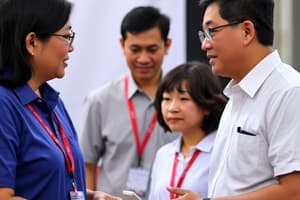Podcast
Questions and Answers
What constraint was placed on Singapore regarding its revenue after the Merger?
What constraint was placed on Singapore regarding its revenue after the Merger?
- Singapore was restricted from issuing Pioneer Certificates.
- Singapore was required to give 40% of its revenue to Kuala Lumpur. (correct)
- Singapore had to keep all its revenue.
- Singapore could retain 60% of its revenue.
Which of the following was NOT a political term agreed upon during the Merger?
Which of the following was NOT a political term agreed upon during the Merger?
- Singapore would have its own Head of State.
- Singapore would have 15 seats in the Federal parliament.
- Kuala Lumpur would control the armed forces.
- Singapore would be allowed to vote in Malaysian elections. (correct)
What was a key economic concern for Malaya regarding the merger with Singapore?
What was a key economic concern for Malaya regarding the merger with Singapore?
- The increase in foreign government control over trade.
- The potential inability to compete with Singaporean industries. (correct)
- An increase in free trade due to the common market.
- The establishment of tax incentives for businesses.
What social provision was made for Singapore citizens in the merger agreement?
What social provision was made for Singapore citizens in the merger agreement?
What was one of the compromises regarding the establishment of the common market?
What was one of the compromises regarding the establishment of the common market?
Flashcards are hidden until you start studying
Study Notes
Political Terms
- Singapore was granted 15 seats in the Federal Parliament.
- Singapore retained control over education and labor policies.
- The Federal government of Kuala Lumpur gained control of Singapore's armed forces, police, and foreign relations.
- A separate Head of State for Singapore was established.
Economic Terms
- A common market was established, facilitating free trade and movement of goods and people between the merged areas.
- No taxes were imposed on goods and travel across regions.
- Singapore's trade and industries were predicted to flourish, leading to increased job opportunities.
- Malaya expressed concern about competition from Singapore's industries.
- A gradual implementation of the common market was agreed upon.
- Singapore committed to providing 40% of its revenue to Kuala Lumpur.
- Singapore was granted the power to issue Pioneer Certificates to businesses, exempting them from taxes for 5-10 years.
Social Terms
- Singaporean citizens retained their citizenship while also becoming Malaysian nationals.
- No voting rights were granted in Malaysian elections to Singaporean citizens, and vice versa.
- Political parties from both Singapore and Malaya were prohibited from participating in elections in either region.
- Malaysian citizens residing in Singapore were not granted special rights but received concessions such as free education until university.
Studying That Suits You
Use AI to generate personalized quizzes and flashcards to suit your learning preferences.




